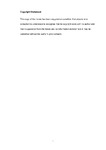"It is possible to reinvent yourself!” An analysis of the learning lives and lived experience of adult literacy students in a Further Education context
| dc.contributor.supervisor | Kelly, Peter | |
| dc.contributor.author | Grundy, Christopher | |
| dc.contributor.other | Plymouth Institute of Education | en_US |
| dc.date.accessioned | 2019-12-09T11:23:48Z | |
| dc.date.available | 2019-12-09T11:23:48Z | |
| dc.date.issued | 2019 | |
| dc.identifier | 380676 | en_US |
| dc.identifier.uri | http://hdl.handle.net/10026.1/15228 | |
| dc.description.abstract |
This research presents an analysis of the life stories of four adult literacy learners studying on a Skills for Life course in a Further Education context in the south west of England, three of whom are returning to education for the first time in their adult lives. Drawing on data generated by semi-structured biographical interviews, a socio-cultural lens is used to gain detailed insights into participants’ life histories and their understandings of the nuanced ways the adult literacy course may be helping them in their lives in the education context and beyond. Findings from the analysis of the participants' life stories clearly show that their personal narratives are shaped by a heterogeneous bricolage of broader discourses available to them in different social contexts. Although the themes of employability and skills, synonymous with neoliberal political discourses of adult education are dominant themes in the participants’ life stories, a rich variety of other narrative themes such motherhood, mental health, dyslexia, marginalisation, social alienation, criminality and substance abuse are also integral to the narratives and the significance of their learning experiences. It is argued that the outcomes of adult literacy learning are by no means reducible to skills acquisition and increases in employability, and that literacy learning experiences can engender a nuanced range of significant, albeit less tangible, " transitions in people's lives that practitioners and policy makers should take in to consideration in devising literacy strategies that meet the needs of people accessing course provision. The representations of the narratives within the analysis show the ways the participants’ course learning experiences, coupled with their exposure to 'alternative' social and education discourses are gradually engendering changes in their literacy practices, their learner identities and world views. Unlike other similar sociocultural research about the outcomes of formal adult literacy education, which so often uses a narrow focus on learners' experiences of the course context using statistical data, the biographical-interpretative approach used in this research situates their learning experiences in broader context of the participants’ life stories. In doing this, the research better illustrates the significance of their learning literacy experiences and the ways literacy learning is helping the participants in their lives within the field of education as well as in other social contexts. The findings strongly indicate that the participants’ literacy learning experiences are having a significant destabilising effect on the ways they conceptualise their learning histories, their learning identities and imagined futures. By aligning with the lifelong learning discourses, the participants‘ emerging identities as lifelong adult learners are manifesting in them critically evaluating and resisting the ways they have previously been disadvantaged in education contexts and imagining new possibilities in education. The research shows that such meaning making processes are a vitally important aspect of the learning process that is integral disadvantaged adult learners realising their imagined futures in the education and therefore is an implication which should be acknowledged by policy makers and practitioners in the field. | en_US |
| dc.language.iso | en | |
| dc.publisher | University of Plymouth | |
| dc.rights | CC0 1.0 Universal | * |
| dc.rights.uri | http://creativecommons.org/publicdomain/zero/1.0/ | * |
| dc.subject | Adult Literacy | en_US |
| dc.subject | Social Practice | |
| dc.subject | Discourse | |
| dc.subject | Identity | |
| dc.subject | Narrative | |
| dc.subject | Life Story | |
| dc.subject.classification | PhD | en_US |
| dc.title | "It is possible to reinvent yourself!” An analysis of the learning lives and lived experience of adult literacy students in a Further Education context | en_US |
| dc.type | Thesis | |
| plymouth.version | publishable | en_US |
| dc.identifier.doi | http://dx.doi.org/10.24382/555 | |
| dc.identifier.doi | http://dx.doi.org/10.24382/555 | |
| dc.rights.embargoperiod | No embargo | en_US |
| dc.type.qualification | Doctorate | en_US |
| rioxxterms.version | NA |
Files in this item
This item appears in the following Collection(s)
-
01 Research Theses Main Collection
Research Theses Main



